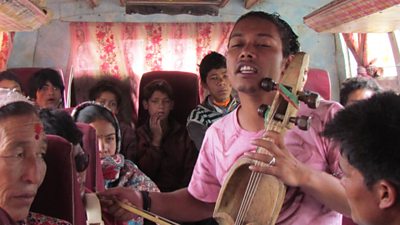I am barely literate … [but] I could take part in this drama because it was improvised with no script to read. The whole experience improved my confidence.
Travelling to villages and towns across the country, the Katha Mitho Sarangiko production team listened to people’s concerns and experiences to construct storylines and then cast the same local people who improvised the drama’s dialogue.
Katha Mitho Sarangiko, together with its partner magazine show Sarangiko Bhalakusari (Sarangi Chat), built a loyal audience of over 5.2 million.
Radio cinema
Improvised acting was at the heart of the drama. The advantage of having no script meant that people with little education could contribute and perform in their own local dialects.
42-year-old mother, Khadgamaya Chemjong Pombo, played a main character in the show.
"My husband thought I was only good for doing chores and cracking jokes. Now he's praising me. I am barely literate … [but] I could take part in this drama because it was improvised with no script to read. The whole experience improved my confidence. My position has changed in the community."
The spontaneity of the acting and high-quality recording on location led to the show being described as radio cinema.
In the drama’s second year, it won the Best non-English output and Team of the Year categories at the ����tv Global Reith awards.
Real-life stories
In 2010 and 2011, the show focused on gender conflict. Through six episodes, each told from the point of view of a different woman, the drama tackled sensitive issues like female trafficking, gang rape, dowry violence, the victimization of widows, and the joys and pains of being a teenager in the city.
In 2012, the focus shifted to governance issues, exploring common economic, social and legal problems faced by people in their everyday lives.
One such issue delayed justice, for example, was explored through a drama about a 25-year-old woman who brings a property case against her brother-in-law only for it to drag on for 35 years.
A member of the audience wrote on the show’s Facebook page that the character represents “many Nepali women... who are deprived of timely justice. This story has inspired Nepali women to fight for justice.”
Topics raised in the drama were then discussed in its sister programme, Sarangiko Bhalakusari (Sarangi Chat). The magazine show consisted of contributions from six regional reporters, interviews and discussions based on listeners' comments from the show’s website, Facebook page, letters and SMS.
